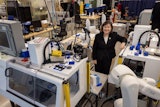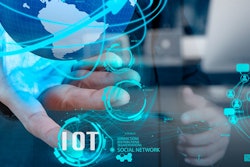All signs point toward manufacturers leveraging data to make decisions quickly, to mine for actionable intelligence, to create a significant — if initially slight — competitive difference versus the competition.
This has never been truer than now as manufacturers embrace the benefits that machine-to-machine data sharing can foster.
IoT Impact – Consumers and Beyond
The IoT’s impact is familiar to consumers. Connected devices like Fitbits monitor the number of steps you take, the quality of your sleep, and the number of calories burned by everyday activities. Cell phones monitor package deliveries and show who’s ringing the doorbell. Robotic vacuum cleaners traverse the living room carpet when needed and room temperatures and lighting react to human activity without input from anyone other than a machine.
The impact in the industrial world will be far more significant and will drive innovations that weren’t possible until now.
The Industrial Internet of Things – Bridge to the Future
The IIoT bridges the shop floor and ERP software to allow for the creation and sharing of data in real time. With machine connections, such as programmable logic controllers (PLCs) and sensors, production data is linked to lot, serial and batch details for a seamless flow of information through the cloud. While these devices collect the information, this data still needs an infrastructure that gives users the ability to house the data, and crunch it quickly. A cloud option provides these necessary resources.
Utilizing data from sensors and other Big Data sources helps businesses analyze data quickly and make better informed decisions. Businesses can better monitor inventory replenishment, sales demands, parts replacement — they can improve virtually any business process to reduce operational and maintenance costs.
A fundamental advantage of a digital infrastructure is the ability to collaborate during the design processes within manufacturing. The approach supports virtual design teams, product configurations at the client site and the download of designs directly to machines. The IIoT provides the platform for intelligent applications to share data and fuel a business transformation as remarkable as the evolution of automation in manufacturing.
When machines share data without human intervention, more intelligent decision making is inevitable. Gartner lists AI as the number one technology trend for 2018, noting that it has the potential to enhance decision making, reinvent business models and remake the customer experience. Gartner predicts that by 2020, 30 percent of CIOs will have AI as a top five investment priority.
If your company isn’t currently laying groundwork in data preparation, integration and model creation to support the momentum of AI and the IIoT, you should rethink your priorities.
The IIoT and the Bottom Line
We’ve seen cases where the IIoT expands data availability, improves accuracy and brings a far greater amount of transparency into the enterprise.
This access to business intelligence will have a significant impact on forecasting, inventory control, customer service; virtually any process touched by comprehensive ERP solutions.
Manufacturers improve performance by linking manufacturing devices to production data such as product counts, temperature variables, quality output tracking and alerts. The potential benefits — in real time — are leaps ahead of where most manufacturers operate today.
Forecasting — always an inexact, time consuming and imperfect process — could be eliminated by communicating point-of-sale inventory information directly to the manufacturer. This exchange of information allows the manufacturer to transition from the make-to-stock production model to the more profitable make-to-order model. Manufacturers can then focus on only producing the in-demand products, reducing the need for slow moving inventory.
Business intelligence which once relied on historical data of past transactions to support decision making now becomes a tool to reveal the present reality.
Who’s Leading?
A recent study of 200 IoT decision makers from global enterprise applications company IFS notes that currently only 16 percent of companies have connected industrial IoT and ERP systems.
You can rightly assume that those companies are the digital transformation leaders that will put more distance between themselves and the laggard companies yet to realize the value of the IIoT in manufacturing.
Industrial equipment and automation vendor Emerson confirms the findings of the IFS study. It finds that only five percent of manufacturers have clear business strategies to leverage the IIoT.
Realizing the immense potential of industrial IoT devices and services is rapidly approaching even if few manufacturers have developed a fully realized IIoT strategy. Gran View Research predicts the IIoT market will grow to more than $900 billion by 2025, expanding by a hefty compound growth rate of approximately 28 percent.
SAP predicts that fully connected companies that leverage the IIoT can expect 60 percent lower maintenance costs to increase productivity improvement.
Current Barriers
Barriers do exist before the IIoT becomes the norm in manufacturing.
Cybersecurity is a legitimate concern when machines and products are connected and exchange data. A strict regimen of vulnerability scanning and data security best practices is a critical requirement. It’s essential to ensure that IIoT data is shared with senior managers and limited to individuals closest to the machine sensors on the shop floor.
Fragmented standards is an issue that must be resolved. It’s common to find multiple standards and platforms within an enterprise value chain.
Data discoverability is a consideration because much of the value realization will depend on integration with third party products and services.
Even with these challenges, the benefits of properly planning for and optimizing the system to fully utilize the benefits of ERP and the IIoT are undeniable.
The best case scenario is when enterprise software operationalizes IIoT data without human intervention. For example, connected heavy-duty industrial machines could monitor usage of end products in the field and issue work orders automatically when they sense the need. They could schedule the appropriate technicians and adjust production schedules based on fault reports and overall equipment calculations. This enables customers to shift from a ”repair after failure” mode to the preferable “repair before failure” approach, reducing the likelihood of a break in business continuity.
All — and more not yet envisioned — is achievable when the enterprise is optimized to leverage the industrial IoT landscape.
ERP has a Central Role to Play in the IIoT
The handwriting is on the wall for manufacturers.
Just as the emergence of sophisticated ERP technology solutions revolutionized manufacturing in the last century, ERP solutions leveraging the rich capabilities of the IIoT change the game in the 21st century. Manufacturers exploiting the inherent strengths of ERP technology with machine learning, machine-to-machine (M2M) communication capabilities and Big Data analytics within the IIoT will yield the best results.
The Industrial Internet of Things and ERP solutions combine to deliver efficiency and cost savings and provide a competitive differentiator over laggard manufacturers slow to embrace emerging technology. Companies lagging behind the manufacturers driving business processes through the IIoT may end up as historical footnotes. Much like established companies once thought invulnerable because of market share and consumer product acceptance, they soon found themselves disrupted by faster, more nimble and innovative upstarts.
That’s a cautionary tale for any manufacturer that wants to retain market share and remain viable in this era.
Jeff Carr is the founder and CEO of Ultra Consultants.























